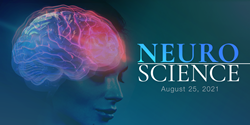
Neuroscience, August 25, 2021
YORBA LINDA, Calif. (PRWEB)
August 19, 2021
Labroots, the leading scientific social networking website offering premier, interactive virtual events and webinars, is delighted to bring Neuroscience 2021 on a global basis gathering neurologists, top scientists, clinicians, leading industry and academia, healthcare professionals and research scholars, who come together under a virtual roof to share emerging developments in neurologic research.
Continuing our commitment of virtual educational offerings, Labroots enthusiastically shares a program snapshot for the one-day online event, including sessions on Integrating Theories of the Brain, Neurodegenerative Disorders – Impacts and Progress, and Mental Health in the Age of COVID-19.
An inclusive symposium supported by the steering committee of renowned academia and industry experts, the NIH BRAIN Initiative team, and sponsors will include these highlights:
- Keynote panel address led by Dr. John Ngai, Director of the NIH BRAIN Initiative, a presentation describing current and future directions of the NIH BRAIN Initiative, including live Q&A with attendees.
- Debate Discussion: Can We Generate an Organizing Theory of the Brain? A 30-minute debate with Florian Engert, Professor of Molecular and Cellular Biology, Harvard University, and David Kleinfeld, PhD, Dr. George Feher Endowed Chair in Experimental Biophysics, Distinguished Professor, UC San Diego, followed by lively Q&A attendee interaction.
- 12 on-demand presentations featuring topics such as Success Stories, Data-Driven (AI) Approaches, and Theory-driven (Mechanistic) Approaches under the session “Integrating Theories of the Brain,” to accelerate the understanding of orchestrating the brain for social behavior, machine learning approaches to interpreting brain wide dynamics, new tools for visualizing neural activity, distinguish rational behavior from optimal behavior, null models of large neural networks, can multiscale computer modeling save the human genome project?: climbing the omes for schizophrenia, and much more.
“We are excited to highlight and showcase in this year’s BRAIN Initiative track the research of our grantees, who have worked hard to integrate – with impressive results – brain circuit theories using quantitative, data-driven (AI/ML), and/or theory-driven (mechanistic) approaches,” commented Dr. John Ngai, Director of the NIH BRAIN Initiative. “In addition, the Labroots virtual format will allow for our sessions to culminate in a live debate that will leave room for audience engagement and feedback, which will help us uncover existing challenges and future opportunities in this space.”
Award lectures spanning the agenda kicks off the day with Dr. Gergely Tóth, CEO and CSO, Cantabio Pharmaceuticals Inc., introducing a keynote presentation on the development of pharmacological chaperons targeting the intrinsically disordered state of misfolding proteins in neurogenerative diseases.
Gergely Tóth, CEO & CSO of Cantabio Pharmacueticals, said “Intrinsically disordered proteins (IDP) make up approximately 40% of the protein-coding human genome, any of which may be viable drug targets. In Alzheimer’s (AD) and Parkinson’s (PD) the aggregation of IDPs is believed to be critical cause of the on-set and progression of these diseases. However, targeting IDPs have been incredibly challenging by small molecule approaches.” Toth added, “During my presentation at the conference, I will discuss the structural biology basis of IDP-small molecule interactions and present in silico and biophysics-based screening approaches, which we have applied to identify novel small molecule chaperons of tau and alpha-synuclein proteins as potential disease modifying candidates for AD and PD.”
Additional streamlined educational content will comprise of prominent speakers in the field covering neurodegenerative disorders – impacts and progress noting innovative research on mechanistic insight into tandem repeat expansions in Amyotrophic Lateral Sclerosis, alpha-synuclein aggregation in Parkinson’s disease – is it relevant and how can we model it, characterizing pathogenic protein aggregates for utilization as molecular tools to accelerate neurodegenerative disease research, naming a few topics. Moreover, SARS-CoV-2 effects on the CNS, and positive psychology and well-being for clinicians and consumers addressing burnout, compassion fatigue and secondary trauma in the COVID-19 era will be examined under the timely Mental Health in the Age of COVID-19 session.
“Neuroscience 2021 will be an innovative and premier educational opportunity for all participants within the neurological field,” said Greg Cruikshank, Chief Executive Officer of Labroots. “With an enlightening agenda complete with hot topics, lively discussions by some of the brightest minds in Neuroscience, attendees will gain knowledge of best practices and strategies to pioneering discoveries to inspiration and collaborations in a complete informative experience. We remain diligent each year to ensuring the most cutting-edge neurological research and breakthroughs are shared to the scientific community to further advance the understanding of how the brain functions both in health and disease.”
Produced on Labroots’ robust platform with the capability to connect across all desktop and mobile devices, the online environment encompasses a lobby, auditorium, interactive poster hall to engage in live chat conversations, exhibit hall (highlighting the latest array of products and technologies), and networking lounge to connect with colleagues, all to provide a one-stop unique educational experience for attendees. By participating in this event, Continuing Education credit (1 per presentation) can be earned for a maximum of 40 credits.
For more information or to register for the event, click here. Participants can follow the conversation online by using #LRneuro.
About Labroots
Labroots is the leading scientific social networking website, and primary source for scientific trending news and premier educational virtual events and webinars and more. Contributing to the advancement of science through content sharing capabilities, Labroots is a powerful advocate in amplifying global networks and communities. Founded in 2008, Labroots emphasizes digital innovation in scientific collaboration and learning. Offering more than articles and webcasts that go beyond the mundane and explore the latest discoveries in the world of science, Labroots users can stay atop their field by gaining continuing education credits from a wide range of topics through their participation in the webinars and virtual events.
Share article on social media or email:

